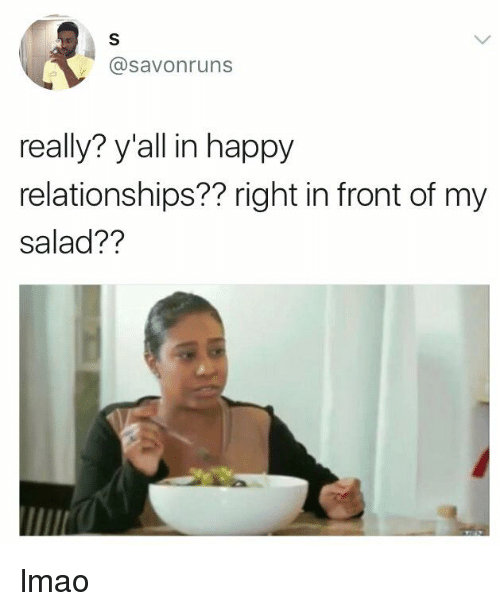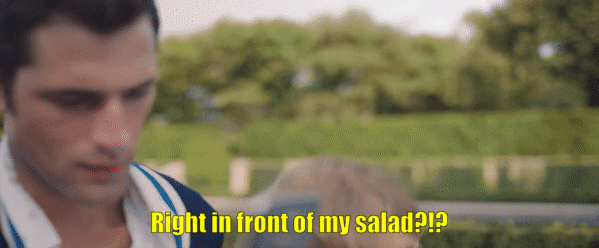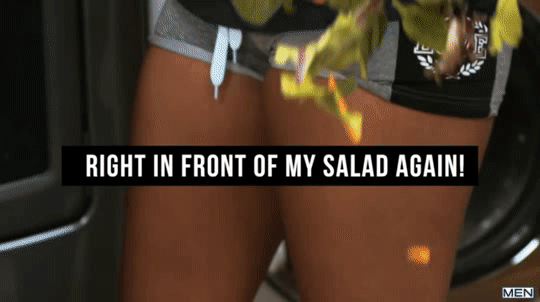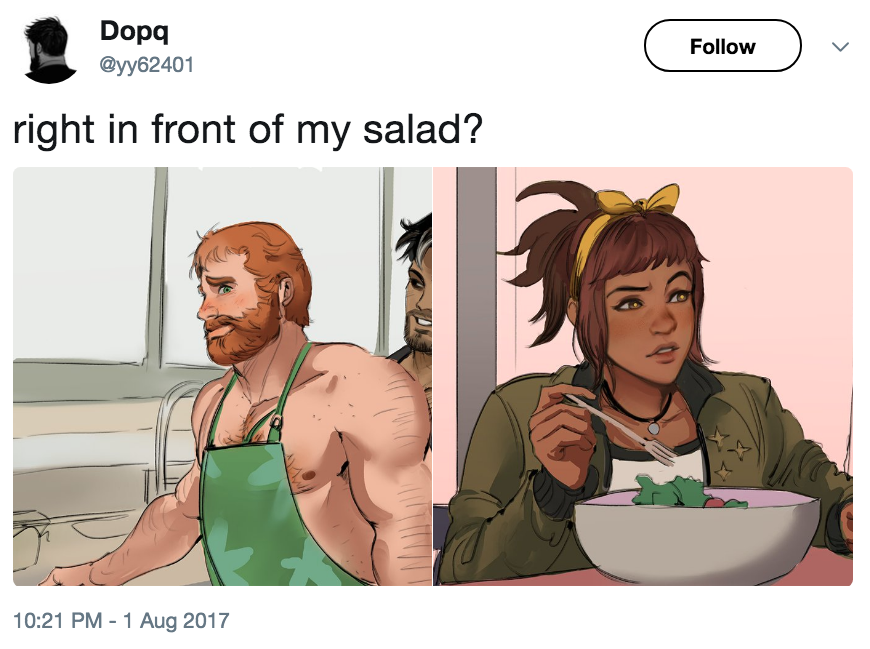Adult films aren’t generally known for their well-crafted scripts, but sometimes the dialogue is so over the top, it can’t possibly not go viral.
Private Lessons 3 opens with Jake (Jake Porter), a private chef, arriving at his client’s house. With his arms filled with groceries, Jake is welcomed at the door by Jaxton (Jaxton Wheeler), who has arranged for Jake to make a salad for his wife (Nikki V), but somehow Jaxton has missed the fact that Jake is marketed as a “naked chef.” Nevertheless, he decides to go along with it, and in the middle of the sexual acts that ensue, Jaxton’s wife returns home from work. Oblivious, she begins to eat the salad that Jake has prepared and makes small talk with the two men who are positioned on the other side of the kitchen counter. Suddenly her suspicions are stirred: “You don’t have a shirt on. […] Wait a minute. You don’t have pants. Are you guys fucking? Are you serious? Right in front of my salad? You guys are fucking gross!”1 Jaxton’s wife leaves in disgust and the two men decide they might as well finish what they’ve started.
Shortly after the film’s release in July 2017, clips from Nikki V’s scene went viral, and she became the undisputed star of the film.2 Her quote and her accompanying image were quickly embraced by gay twitter and other social media sites, following the narrative that Sean Rintel describes as standard for crisis memes.3
 At first, the joke seemed to be the at the expense of the original film. By merely posting the clip, or the quotation from the clip alongside other images, the joke had to do with the dialogue itself. As the meme gained traction, however, the viral video-turned-gif began to morph, losing its original context. As seen in the examples to the right, the clip began to be appropriated for any instance in which a reaction of shock, outrage, or disbelief were called for.
At first, the joke seemed to be the at the expense of the original film. By merely posting the clip, or the quotation from the clip alongside other images, the joke had to do with the dialogue itself. As the meme gained traction, however, the viral video-turned-gif began to morph, losing its original context. As seen in the examples to the right, the clip began to be appropriated for any instance in which a reaction of shock, outrage, or disbelief were called for.
As more variations and remixes of the meme appeared, much of the original context (as bad dialogue from a gay adult film) was lost. Surely, many of the creators of these remixed instances, along with their viewers, were aware of the clip’s origin, but part of the fun (as seen in the meme to the right) was that so many weren’t. Although the non-queer public’s embracing certain elements of gay culture is not terribly new (the main demographic of RuPaul’s Drag Race is now said to be straight women and their adoption of gay slang is often lampooned in queer culture), the “Right in Front of My Salad” meme was unique in that its use by non-queer individuals prompted another, distinctly different wave of remixes and jokes.
This later tendency made me wonder how these two different audiences interact with one another. Of course, I might note that it’s more than possible for someone who identifies as straight to have seen Private Lessons 3; likewise, it’s not even all that farfetched for a gay man to go through his entire life and never be asked, “Are you serious? Right in front of my salad?” Nevertheless, the memes that center around the surprise to be had when the origins are revealed generally rely on a perceived innocence before the eventual, shocking discovery. Based off of this, it might be perceived that the gay community is having a laugh at the expense of these unknowing others (trolling them, Milner might say, as their “discomfort” becomes the joke).4 But more often than not, this doesn’t seem to be the case; those who are posting this content tend to be women and not gay men. A kind of diaspora can be traced as the meme went from being an inside joke for gay men (or, at least, viewers of gay pornography) to being a joke about being shocked by gay men and gay pornography. Although the appropriation of queer cultures by a more mainstream culture is not often problematic, might some level of homophobia be embedded in this latter instance?
Accordingly, Poe’s Law comes into play. Milner quotes the site Know Your Meme in describing Poe’s Law as the difficulty “to distinguish extremism from satire of extremism in online discussions unless the author clearly indicates his/her intent” (Milner). In this instance, we don’t know whose satire it is, and (for that matter) who ends up being the butt of the joke.
 One other interesting aspect regarding how this meme relates to our readings for this week can be seen in the afterlife of the original film, as it’s followed a similar trajectory as the one that Reeve traces for the website, Lifehackable. When Lilley and Greenfield altered their approach to their site Lifehackable, they did so because they realized that the “negative attention” that their employee’s backwards post brought to the site turned out to be a good business strategy.5 As Lilley points out, “[I]n sucking, he succeeded.” In a similar way, and perhaps in more than one way (please notice my clever double entendre), the producers of Private Lessons 3 have also embraced their past failures and have recently released a video titled Right in Front of My Salad Again!, in which Jaxton is up to his old ways, and his poor wife finds another perfectly good salad ruined.
One other interesting aspect regarding how this meme relates to our readings for this week can be seen in the afterlife of the original film, as it’s followed a similar trajectory as the one that Reeve traces for the website, Lifehackable. When Lilley and Greenfield altered their approach to their site Lifehackable, they did so because they realized that the “negative attention” that their employee’s backwards post brought to the site turned out to be a good business strategy.5 As Lilley points out, “[I]n sucking, he succeeded.” In a similar way, and perhaps in more than one way (please notice my clever double entendre), the producers of Private Lessons 3 have also embraced their past failures and have recently released a video titled Right in Front of My Salad Again!, in which Jaxton is up to his old ways, and his poor wife finds another perfectly good salad ruined.
This is the first time I’ve even attempted to write about pornography for an academic purpose, but it seems to be a great fit for what we’re discussing. For example, Right in Front of My Salad Again! mimics what Milner calls the logic of lulz, in that “[t]he blur between irony and earnestness makes room for discourse otherwise impermissible” (Milner). The sequel to the gay porn is well aware of the joke, but for all that, it’s still very clearly porn; it’s still going to get the job done.
Lastly, I have to fit in this last meme, which is ULTRA gay, as it recasts Private Lessons 3 with characters from the gay dating simulator video game Dream Daddies. It’s too much!
- Right in Front of My Salad? – Official Free Gay Scenes – Men. https://www.men.com/scene/42291/right-in-front-of-my-salad/?joinscene=13371. Accessed 11 Feb. 2018. ↩
- Adam. “Right In Front Of My Salad.” Know Your Meme, Sept. 2017, http://knowyourmeme.com/memes/right-in-front-of-my-salad. ↩
- Rintel, Sean. “Crisis memes: the importance of templatability to Internet culture and freedom of expression.” Australasian Journal of Popular Culture 2:2 (2013): 253-271. ↩
- Milner, Ryan M. “Hacking the Social: Internet Memes, Identity Antagonism, and the Logic of LULZ.” The Fibreculture Journal Issue 20 (2013). ↩
- Reeve, Elspeth. “The Secret Lives of Tumblr Teens.” New Republic 247:3 (2014): 46-59. ↩





